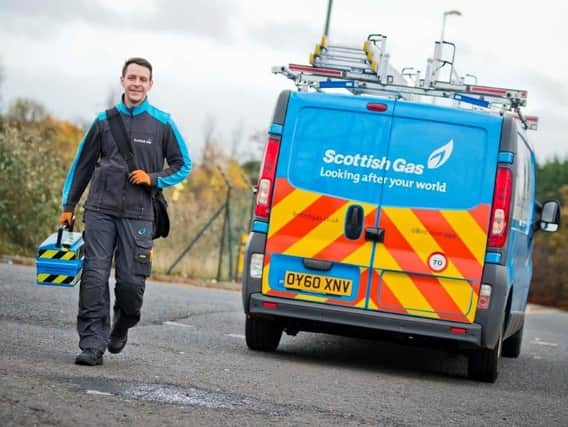Edinburgh residents: Here are nine tips from Scottish Gas to help you stay warm this winter


Scottish Gas is predicting more than 1,000 engineer call outs across the capital next week to support with problems in the home.
But Danny Stewart, a local Scottish Gas service and repairs engineer, has provided the following tips to help prepare your home for the winter...
Advertisement
Hide AdAdvertisement
Hide Ad1. Bleed your radiators: If you haven't used the heating for a while, air can enter the system and form bubbles and at the top of your radiators, which stops them working efficiently.
If you notice cold spots at the top of your radiators, switch them off and when cool, turn a radiator key in the valve at the top to let the air out. Have a rag or a small container to hand so you can catch any drips.
Keep in mind that bleeding your radiator may cause the system pressure to drop. If you have a pressure gauge on your boiler, give it a quick check and top up as necessary.
Cold spots at the bottom or centre of the radiator may be an indication of sludge build up and the need for system flushing – you might need a gas engineer to help you with this.
Advertisement
Hide AdAdvertisement
Hide Ad2. Block the Breeze: For windows and doors that don't seal properly, there are lots of options to help keep cold air out and warm air in.
Fitting draught excluders – available from most DIY stores – is a quick, easy and affordable way to cut down on your energy bills and draught-proof your home. Letterbox brushes, chimney balloons and even keyhole coverings can also make a real difference.
3. Maximise the heat: Think about where your heat sources are. Putting your sofa in front of a radiator may keep the best spot in the house extra toasty, but it will absorb heat that could be warming the rest of the room.
Hanging curtains and placing rugs on the floors are some of the simplest and most effective ways to keep warm, with thick material preventing heat loss through windows and doors. Just don't forget to open your curtains during the day so that the sun can get in.
Advertisement
Hide AdAdvertisement
Hide Ad4. Look after your boiler: Make sure your boiler’s working properly before the first frost. For peace of mind, there is the option to protect your boiler, heating, electrics and plumbing by contacting British Gas for one of their Homecare products. You can have your boiler serviced every year for less than 40p a day.
5. Insulate your hot water system: Stopping heat from escaping doesn’t just save you money. When temperatures drop below zero, it’s important to make sure that the water inside your pipes doesn’t freeze and cause them to burst. Lagging materials are available from most DIY stores – an easy, cost-effective solution for protecting your water tank and pipes.
6. Be energy smart: It’s inevitable that our energy use will increase when the heating’s on over winter, but there is a simple way to keep track of how much you’re using – and spending. With a smart meter, you’ll be able to see how much energy you’re using in pounds and pence, helping you to identify where you can make savings during peak energy season.
To find out more about smart meters visit here
7. Install a carbon monoxide detector: You can’t hear it, see it, taste it or smell it, and it kills around 30 people a year. Faulty central heating systems are one of the most common sources of carbon monoxide in the home – as well getting your boiler checked once a year, it’s essential to have a carbon monoxide alarm fitted.
Advertisement
Hide AdAdvertisement
Hide AdAvailable through British Gas or from your local DIY store, the detectors last between five and seven years, so check yours is in date and test it to be certain it’s working.
8. Use tech to control your heating remotely:'¯It's possible to control your heating and hot water remotely from your smartphone.
With Hive Active Heating, you can turn the heating on when you’re coming home from work, so the house warms up in time for your arrival – equally, if you’re running late for any reason, having the flexibility to control your heating on the go means you’ll never waste money on energy you’re not using.
9. Get the help you’re entitled to: It’s worth finding out if you’re eligible for extra assistance with your energy bills, especially at this time of year.
Advertisement
Hide AdAdvertisement
Hide Ad£140 winter rebates are available through the Warm Home Discount scheme, and face-to-face advice, financial support and grants are available from the British Gas Energy Trust (even if you’re not a British Gas customer).
Customers who need an extra hand with the practical side of things can sign up to be on the Priority Services Register, for additional services such as different bill formats and advanced warnings if their energy supply is facing disruption.